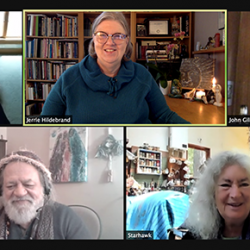 In the branch of witchcraft in which I practice, we believe that words and thoughts have real impacts on the world around us, that what we speak into the world has a life and a force that can have extraordinary power to it. Therefore, it is important to be conscious and deliberate about the words we speak and even our thoughts. I’ve learned a variety of techniques to practice this
In the branch of witchcraft in which I practice, we believe that words and thoughts have real impacts on the world around us, that what we speak into the world has a life and a force that can have extraordinary power to it. Therefore, it is important to be conscious and deliberate about the words we speak and even our thoughts. I’ve learned a variety of techniques to practice this
kind of consciousness and deliberation, but none of them really stuck, until I began working with the god Hermes.
Several years ago, when I began working more closely with Hermes, he asked me to commit to only speaking things that were true. This doesn’t mean complete honesty, of course, as partial truths and omissions can be misleading, but still it was a commitment to a more radical honesty than is usually practiced in our culture.
What do you say when you feel horrible, physically or emotionally and someone asks you a social “how are you?” How do you respond to requests for your opinion on someone’s taste when you have a dramatically different taste? What if someone you love asks you to be on their side in an argument, but you think they’re wrong? I have been carefully trained to tell small lies to get out of situations like this, the small social lubricant lies that our culture uses, theoretically to keep us all from being horribly offensive all the time.
I have found, though, that I can be kind and tactful and gracious and still be honest. I can affirm what I can affirm and choose not to comment on the others. I can report that I am “okay” all the time – I’m not in imminent mortal peril, so on some level I’m “okay,” even if “fine” is too much of a stretch. Really, the small places where I might have been tempted to lie before this commitment are easy enough to negotiate.
I’ve been reflecting recently on the many other situations in which I might be tempted to lie. One is hyperbole. I’ve noticed a distinct penchant for exaggeration for effect in my way of relating my experiences. Now, I notice these moments of not-quite- truth or blatant exaggeration and feel compelled to correct them.
Another situation in which I might be tempted to lie is to get myself out of a sticky or conflicted situation in a relationship, either in my life or my work. From things like why I’m late to a particular meeting or why I did something that the other person is angry about, it can be tempting to cover over the real dynamics of a difficult situation in order to make peace. The trouble is, even before making this commitment, I had noticed that the less honest I am in situations like this, the more the conflict tends to grow or have a life of its own over time.
So, instead, situations like these call for taking a deep breath, summoning my courage, and telling the truth about my shortcomings and my experience of the situation. Usually, I find that others respond to that vulnerability and honesty with a similar offering of trust and desire to find a way to repair the relationship. Not always, of course – that would be too easy – but most of the time.
What I have learned most from this practice is to be conscious of my words all the time. To think about what I’m saying and take responsibility for it. If I am committed to never saying something that isn’t true, then I have to listen carefully to everything I say. When I have said something untrue, I need to correct it, as soon as possible. On occasion, I think this might make me an annoying conversation partner. (“Actually, what I should have said was…”) But for me, it gives me a push toward consciousness of my words and their consequences that I didn’t have before, and this has been such a valuable window into my own consciousness and into my impact on the world around me.
How do you stay aware of your words and thoughts? How do you practice accountability for their impacts?













